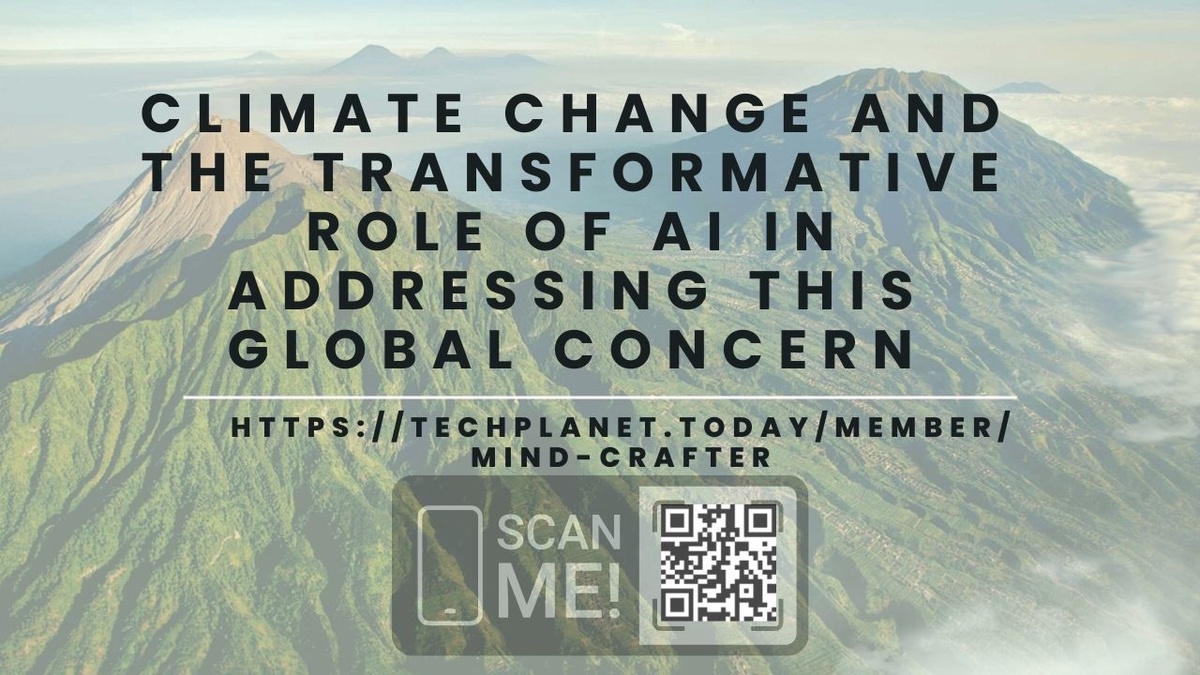Climate Change and the Transformative Role of AI in Addressing This Global Concern:
Introduction:
Climate change is one of the most pressing challenges humanity faces today. It refers to the long-term alteration of Earth's average weather patterns and temperatures, primarily driven by human activities that release greenhouse gases into the atmosphere. As the consequences of climate change become increasingly evident – from rising sea levels to extreme weather events – urgent actions are required to mitigate its impact. In this critical juncture, artificial intelligence (AI) emerges as a powerful tool that can significantly contribute to understanding, managing, and mitigating climate change.
The Significance of Artificial Intelligence in Climate Change:
Artificial intelligence, often referred to as AI, encompasses the development of computer systems capable of performing tasks that would typically require human intelligence. The importance of AI in the context of climate change lies in its ability to process vast amounts of data, identify patterns, and make predictions. These capabilities are crucial for analyzing the complex interactions within Earth's climate system and predicting future trends with a high degree of accuracy.
AI in Climate Change: Reshaping Industries
- Transforming the Automotive Industry: The emergence of electric and autonomous vehicles has the potential to revolutionize the automotive industry, reducing its carbon footprint significantly. AI plays a pivotal role in advancing electric vehicle technology, optimizing battery performance, and enhancing self-driving capabilities. These innovations contribute to decreased reliance on fossil fuels and subsequently mitigate emissions from traditional internal combustion engine vehicles.
- Revolutionizing Solar Panels: Solar energy is a clean and renewable source of power. AI algorithms are being employed to optimize the efficiency of solar panels by analyzing weather data, tracking the sun's movement, and adjusting panel angles. This AI-driven optimization leads to increased energy generation, making solar power a more viable alternative to fossil fuels.
- Industrial Automation for Petroleum Reduction: Industries are major contributors to greenhouse gas emissions, particularly those reliant on petroleum-based energy sources. AI-driven industrial automation systems can streamline manufacturing processes, reducing energy consumption and waste. By optimizing resource usage, these systems play a crucial role in transitioning industries away from fossil fuels.
- Enhancing Agriculture and Land Use: AI technologies are transforming agriculture by enabling precision farming techniques. Through the analysis of climate and soil data, AI can guide farmers to optimize irrigation, fertilization, and planting schedules. This not only improves crop yields but also reduces water and chemical usage, contributing to a more sustainable agricultural sector.
New Opportunities for Innovation:
The intersection of AI and climate change presents new avenues for innovation and growth across various sectors. The development and application of AI-driven solutions not only address environmental concerns but also create economic opportunities. Entrepreneurs and businesses that invest in AI-driven sustainability solutions position themselves as leaders in a rapidly evolving landscape, fostering a green economy while addressing climate change.
Conclusion:
The ongoing battle against climate change requires collaborative efforts from all sectors of society. As technological advancements continue to shape our world, harnessing the potential of AI is imperative. From reshaping industries to fostering innovation, artificial intelligence offers a promising path towards mitigating the impact of climate change. By leveraging AI's capabilities to analyze complex climate data, optimize resource usage, and drive sustainable practices, we can strive towards a greener and more sustainable future. As we look ahead, embracing AI in climate change becomes not just a choice but a necessity to safeguard the planet for generations to come.
AI in Climate Change: As the world grapples with the challenges of climate change, artificial intelligence emerges as a crucial tool that has the potential to reshape industries, drive innovation, and contribute to a more sustainable future. By harnessing AI's analytical prowess and predictive abilities, we can work towards mitigating the impact of climate change and fostering a greener world.
Impact-Site-Verification: ee0e578a-74df-40cd-a924-17200e13e7b4


No comments yet